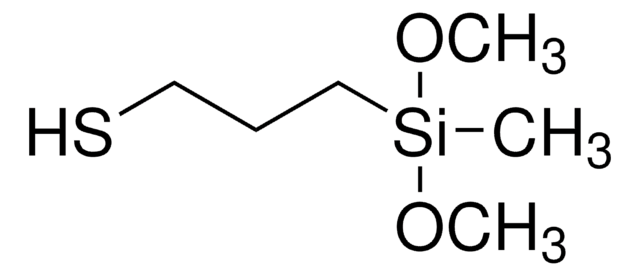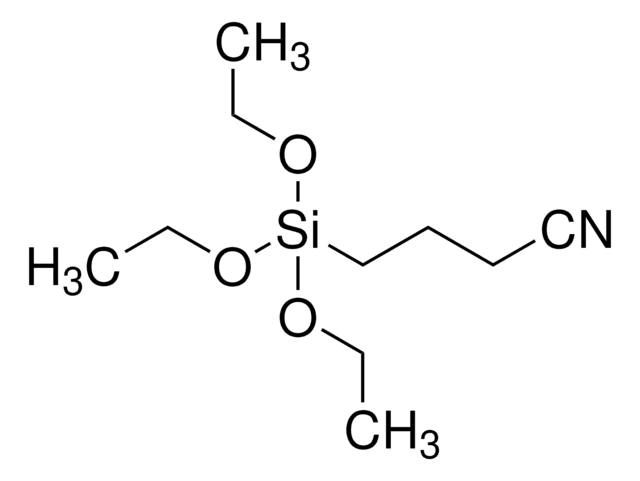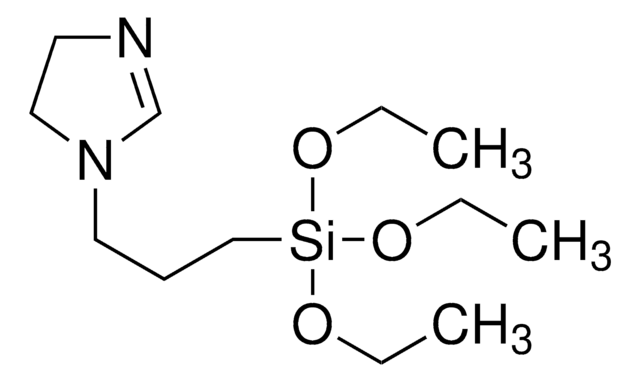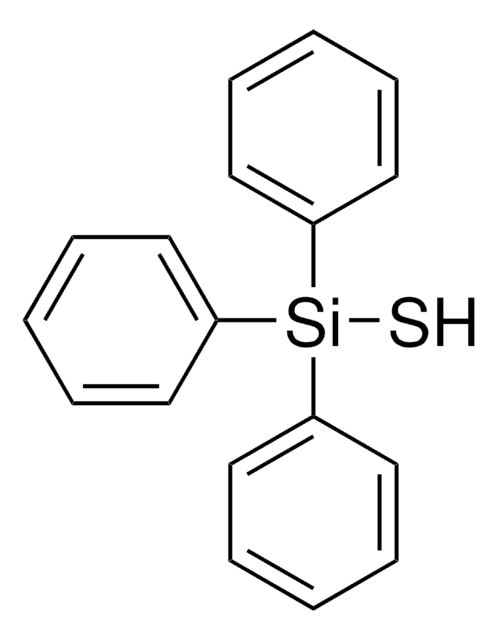63797
(3-Mercaptopropyl)triethoxysilane
≥80% (GC), technical
Synonym(s):
3-Triethoxysilyl-1-propanethiol
Sign Into View Organizational & Contract Pricing
All Photos(1)
About This Item
Linear Formula:
HS(CH2)3Si(OCH2CH3)3
CAS Number:
Molecular Weight:
238.42
Beilstein:
2039575
EC Number:
MDL number:
UNSPSC Code:
12352103
PubChem Substance ID:
NACRES:
NA.22
Recommended Products
grade
technical
Assay
≥80% (GC)
density
0.987 g/mL at 20 °C (lit.)
storage temp.
2-8°C
SMILES string
CCO[Si](CCCS)(OCC)OCC
InChI
1S/C9H22O3SSi/c1-4-10-14(11-5-2,12-6-3)9-7-8-13/h13H,4-9H2,1-3H3
InChI key
DCQBZYNUSLHVJC-UHFFFAOYSA-N
General description
3-mercaptopropyl trimethoxysilane (MPTMS) is commonly used in surface modification of silica nanoparticles by creating thiol group on the surface.
Application
(3-Mercaptopropyl)triethoxysilane (MPTS) can be used as a reagent to prepare thiol functionalized materials. Silica, SBA-15, alumina, starch, and graphene can be functionalized with MPTS and used in various applications.
MPTS functionalized SBA-15 probe is used to determine dissolved mercury in solution.
MPTS functionalized SBA-15 probe is used to determine dissolved mercury in solution.
Hazard Statements
Precautionary Statements
Hazard Classifications
Aquatic Chronic 2
Storage Class Code
10 - Combustible liquids
WGK
WGK 3
Flash Point(F)
190.4 °F - closed cup
Flash Point(C)
88 °C - closed cup
Personal Protective Equipment
dust mask type N95 (US), Eyeshields, Gloves
Certificates of Analysis (COA)
Search for Certificates of Analysis (COA) by entering the products Lot/Batch Number. Lot and Batch Numbers can be found on a product’s label following the words ‘Lot’ or ‘Batch’.
Already Own This Product?
Find documentation for the products that you have recently purchased in the Document Library.
Customers Also Viewed
Greg J Nusz et al.
ACS nano, 3(4), 795-806 (2009-03-20)
We present the development of an analytical model that can be used for the rational design of a biosensor based on shifts in the local surface plasmon resonance (LSPR) of individual gold nanoparticles. The model relates the peak wavelength of
Tuo Gao et al.
Sensors (Basel, Switzerland), 19(11) (2019-06-07)
Nanoparticle based chemical sensor arrays with four types of organo-functionalized gold nanoparticles (AuNPs) were introduced to classify 35 different teas, including black teas, green teas, and herbal teas. Integrated sensor arrays were made using microfabrication methods including photolithography and lift-off
Preparation of colloidal gold multilayers with 3-(mercaptopropyl)-trimethoxysilane as a linker molecule
Tseng J-Y, et al.
Colloids and Surfaces. A, Physicochemical and Engineering Aspects, 182(1-3), 239-245 (2001)
Ning Gan et al.
International journal of nanomedicine, 6, 3259-3269 (2012-01-10)
The purpose of this study was to devise a novel electrochemical immunosensor for ultrasensitive detection of alfa-fetoprotein based on Fe(3)O(4)/Au nanoparticles as a carrier using a multienzyme amplification strategy. Greatly enhanced sensitivity was achieved using bioconjugates containing horseradish peroxidase (HRP)
Guobin Shan et al.
Theranostics, 3(4), 267-274 (2013-04-23)
Nanotechnology approaches offer the potential for creating new optical imaging agents with unique properties that enable uses such as combined molecular imaging and photo-thermal therapy. Ideal preparations should fluoresce in the near-infrared (NIR) region to ensure maximal tissue penetration depth
Our team of scientists has experience in all areas of research including Life Science, Material Science, Chemical Synthesis, Chromatography, Analytical and many others.
Contact Technical Service




![Bis[3-(triethoxysilyl)propyl] tetrasulfide technical, ≥90% (NMR)](/deepweb/assets/sigmaaldrich/product/structures/242/790/625f5cba-32bd-4acf-a3be-e119e9cf844f/640/625f5cba-32bd-4acf-a3be-e119e9cf844f.png)








![N-[3-(Trimethoxysilyl)propyl]ethylenediamine 97%](/deepweb/assets/sigmaaldrich/product/structures/149/508/f87a9a89-f138-4c5e-9fe0-6561914241c3/640/f87a9a89-f138-4c5e-9fe0-6561914241c3.png)
